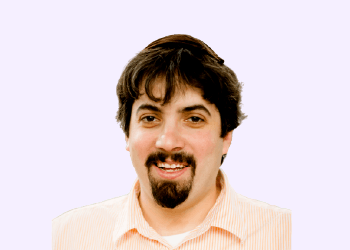In this episode, we cover:
Today, we speak to Barry Schwartz, the CEO of RustyBrick, a New York Web service firm specializing in customized online technology that helps companies decrease costs and increase sales.
He is also the executive editor of Search Engine Roundtable, the news editor at Search Engine Land, and a former news editor at Search Engine Watch.
In this episode, he will discuss SEOZ trends for 2020.
Stay tuned for the next podcast episode, where our guests, Piotr and Matt, tell us the difference between SEO and PPC keyword research.
Show notes
- [00:51-02:05] Do you think Bing, DuckDuckGo, and other such search engines are doing enough to break the monopoly of Google?
- [02:07-05:02] With Google tightening the screws around some SEO practices, do you think there’s still enough left in the tank for SEOs?
- [05:27-07:12] What SEO strategy, according to you, is future-proof from being affected by these frequent algorithm updates?
- [07:36-10:37] Is Google trying to transform itself into a complete knowledge hub?
- [10:57-13:25] What are the best practices people can follow when it comes to writing meta descriptions?
- [13:51-15:07] Is voice search going to be dependent entirely on knowledge graphs, or is Google going to pick up information from other audio files?
- [15:25-18:12] What do you think is the biggest change in the SERPs that’s going to come up in the future?
- [18:56-20:52] How do you think the EAT factors are going to shape up the future?
Show Notes Explanation
Hey guys, this is Senthil. Welcome to another episode of SEO On-Air. Our special guest for today is the executive editor of Search Engine Roundtable, the news editor at Search Engine Land, and a former news editor at Search Engine Watch. I know most of you have guessed his name by now.
He is also known for his exceptional work ethic and genuine dedication to our community. Let’s welcome Barry Schwartz to our show. We’ve been following Barry for more than a decade and he has the pulse of the whole industry for years now.
Time Stamp: 00:51-02:05
Q. Do you think Bing, DuckDuckGo, and other such search engines are doing enough to break the monopoly of Google?
- The reality is no; they aren’t. Microsoft Bing has always said that they have a 30% share globally, but, if you see anybody’s analytics, it’s 90% Google and 10% is the rest of the search engines.
- DuckDuckGo is not even on the list. However, there are talks that Apple might buy DuckDuckGo. Only time will say if Apple could make DuckDuckGo take over Google in terms of popularity.
Time Stamp: 02:07-05:02
Q. With Google tightening the screws around some SEO practices, do you think there’s still enough left in the tank for SEOs?
- SEO is a lot different than it was 10 years ago. It is about building really great websites. There are a lot of things you can do with SEO right now, such as content marketing and technical SEO.
- It is not about page rank anymore. SEO practices have got more professional right now.
- Technical SEO is very important for large websites with crawl budgets and crawling issues because you can tweak things around.
- Making websites search-engine friendly was the target of technical SEO a few years back, but now, you get search-engine CMS by default, such as WordPress.
Time Stamp: 05:27-07:12
Q. What SEO strategy, according to you, is future-proof from being affected by these frequent algorithm updates?
- You shouldn’t panic about algorithm updates and focus on building a site that Google loves to rank
- Focus on quality content and other such improvements so that Google considers your site as authoritative
Time Stamp: 07:36-10:37
Q. Is Google trying to transform itself into a complete knowledge hub?
- It is never the case where Google would say they don’t need publishers or SEOs
- Although Google is coming up with these knowledge panels, Google would never want to cross the line where it’d limit people from creating or optimizing content
Time Stamp: 10:57-13:25
Q. What are the best practices people can follow when it comes to writing meta descriptions?
- Don’t worry about meta descriptions. Google will provide them if you don’t have them for your web pages or if the meta description isn’t suitable for the web page.
- Google came up with a voice-search feature called “speakable markup.” It is not really something that most publishers could do, so only if you have the time, try optimizing the meta descriptions.
Time Stamp: 13:51-15:07
Q. Is voice search going to be dependent entirely on knowledge graphs or Google is going to pick up information from other audio files, as well?
- Not too long ago, Google announced that they are going to listen to audio files and serve up answers based on them. But, this feature isn’t visible as of now.
- Automatic transcriptions are also pretty impressive on YouTube so Google might utilize them, as well.
Time Stamp: 15:25-18:12
Q. What do you think is the biggest change in the SERPs that’s going to come up in the future?
- The biggest thing that Google announced was the product experience update.
- Probably it won’t do any significant changes in the organic rankings due to this
- In terms of search features, voice search is an interesting topic to look forward to in the future
- We are going to see more features in Google Maps related to social distancing in the wake of COVID-19
- Google Glass for Apple and Apple Carplay are two big launches that are something to be excited about
Time Stamp: 18:56-20:52
Q. How do you think the EAT factors are going to shape up the future?
- Google doesn’t say you need to focus on EAT because there’s no specific ranking signal related to EAT
- To convey your authority, you need to have an author bio that speaks of your credentials as a writer
- It’s less about adding structured data or author bio but more about writing content that’s trustworthy and well-researched
Meet the speakers

Senthil Kumar
VP Marketing – Stan Ventures

Barry Shwartz
Owner – RustyBrick, Inc.
Guest Bio

Barry Shwartz
Owner – RustyBrick, Inc.
Barry Schwartz is the CEO of RustyBrick, a New York Web service firm specializing in customized online technology that helps companies decrease costs and increase sales. Barry is also the founder of the Search Engine Roundtable and the News Editor of Search Engine Land. He is well known & respected for his expertise in the search marketing industry. Barry graduated from the City University of New York and lives with his family in the NYC region.

